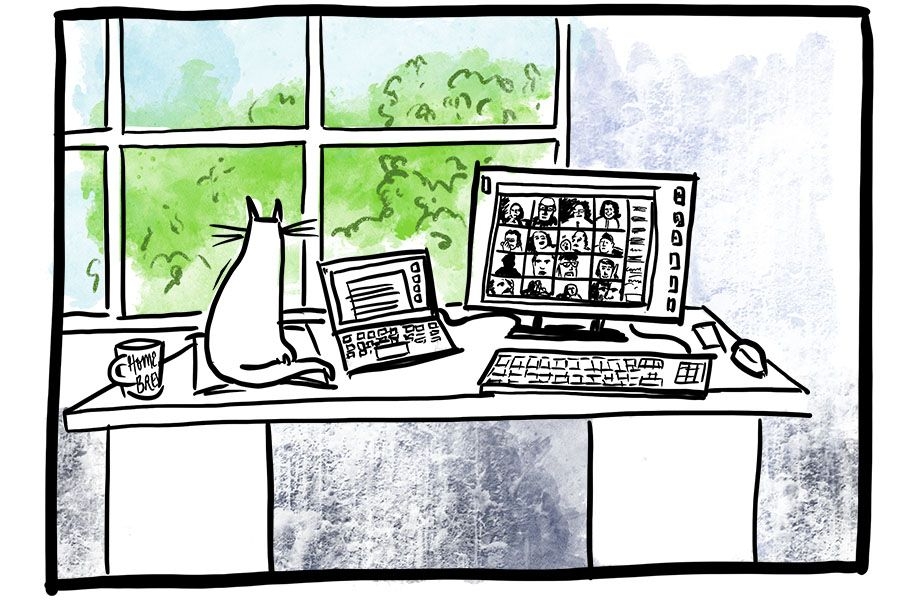In a world of remote workers, event planners race to engage online employees.
Remote work is likely here to stay. But what happens to workplace culture in the absence of an in-person office?
According to an October 2020 survey from internet security research firm Twingate, social connection was the thing people missed most about going to work, with office banter and face-to-face meetings coming shortly after.
For some software designers and event planners, the need to connect and build company culture online presents an opportunity. By developing hybrid platforms capable of engaging both online and live attendees, event planners and organizers are evolving to meet the needs of remote teams. Although some companies worry hybrid and online-only events are less engaging, new ways of data collection and connecting remote attendees are emerging to assuage those fears.
Despite the social disconnect of remote work, it is likely here to stay. A 2021 survey of 1,500 hiring managers found by freelancing platform Upwork found 61.9% of companies were planning more remote work now and in the years to come, and estimated that 22% of the American workforce, 36.2 million workers, will be working remotely by the year 2025 — an 87% increase from pre-pandemic levels.
One entrepreneur moving into the remote business event space is game designer Rikki Tahta, creator of popular card game “Coup,” where players assume the roles of rival politicians who rob, assassinate, and stage coups against one another. After spending 18 years working in finance, Tahta wanted to turn to game designing full time, and founded MeetMax Games in 2016.
Tahta personally enjoyed playing games with big groups, and began running and designing large-scale screen games for private parties. During COVID-19, MeetMax’s business from corporate events went up significantly as team leaders were looking for team-building activities that could include remote employees.
“We got feedback from our clients that said we want our employees to get to know each other better and communicate better, but in a way that’s outside of the workplace so that work hierarchies don’t confuse people’s ability to let their guard down,” says Tahta.
To help in the development of games that helped with remote team building, MeetMax hired a pair of psychologists to help them with engagement of remote attendees.
That research showed two main elements of remote working event coordination needed to address — The first obstacle was limited understanding. Employees in different time zones and those who work asynchronously didn’t develop rapport and small talk that typically helps people understand each other. The video medium was also found to be limiting. Thata says video is “infinitely” better than communicating via text or phone call, but there’s still a lot people miss out on.
Each of MeetMax’s games requires the teams to work with one another, usually with each player having a different role or some key form of communication disabled so groups have to get creative.
Games include “An Elephant on Mars,” where teams build and coordinate a fictitious space shuttle launch to put animal life on a terraformed future Mars, as well as “At the Races” where players train and race virtual horses while sabotaging their opponents.
Glenn Price, account executive at Aventri, a digital event management company, says his company is working on advancing hybrid experiences capable of engaging attendees both online and in-person.
“The overwhelming majority of people I talk to are going back to in-person events, but they want to have a hybrid option open because not everyone is going to want to come back to the office,” says Price.
Aventri is employing mobile apps to help give virtual attendees the interactions with presenters and product demonstrators. The apps can also organize games and challenges for remote and in-person attendees.
The challenge with deploying the new hybrid platform is the ability to show engagement. Attendance numbers are an easy way to track if someone came to an event, but Price says companies have been more hesitant to value online engagement the same way, since it can be a shorter time commitment.
Price also noted that some clients were worried having remote attendance options would discourage people from showing up in-person, since remote attendance is easier, and doesn’t require a plane flight.
To solve this, Aventri is keeping online attendants tracked with surveys, as well as giving remote attendees the ability to attend booths and product demonstrations with a live attendant showing them around, or talking to the presenters directly. These interactions are typically much longer, and can give the participant more of an opportunity to engage with the event.
“The idea is you can have someone who wishes they could be there experience the event through a one-on-one interaction with someone who is already at the Oregon Convention Center,” says Price. “That’s how you bridge the gap between the two worlds.”
To subscribe to Oregon Business, click here.








